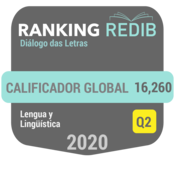THE ERRANCE OF HISTORY: SCISSION, MOVEMENT AND CONTINGENCY IN THE WORKING OF DISCOURSE
DOI:
https://doi.org/10.22297/2316-17952022v11e02229Keywords:
Discourse, History, Pêcheux, Error, Errance, Sedentarization.Abstract
Based on the Discourse Analysis of Michel Pêcheux (2008; 2009) and on the Epistemology of Errance (ALMEIDA, 2019), this article aims to theorize about the notions of errance, sedentarization and error in the functioning of history and memory discursive. The concept of errance has to do with the contingent, fundamental and incorrigible movement that produces dislocations both in the linguistic base and in the discursive processes; the term sedentarization, on the other hand, refers to the rooting and establishment of walls, it is control, administration, grouping, repetition and accumulation of meanings. Thus, it is important for this text to analyze certain effects of the historical sedentarization of meaning in contemporary times. Methodologically, this text will be based predominantly on the work Discourse: Structure or Event (PÊCHEUX, 2008), analyzing the effects of the logically stabilized discourse, produced by subjects of the discourse that Pêcheux calls “specialists”. Finally, we will propose another way of producing and circulating historical knowledge, namely, the Epistemology of Errance.
Downloads
References
ALMEIDA, J. F. Epistemologia da errância: erro, hiância e ciência em discurso. Campinas: Pontes Editores, 2019.
ALTHUSSER, L. A corrente subterrânea do materialismo do encontro. Crítica Marxista. Rio de Janeiro: Editora Revan, 2005.
ALTHUSSER, L. Posições. Rio de Janeiro: Edições Graal, 1978.
ARISTOTELES. Órganon: Categorias, Da Interpretação, analíticos anteriores, analíticos posteriores, tópicos, refutações sofísticas. Bauru: EDI-PRO, 2005.
BACON, F. Novum Organum, ou Verdadeiras interpretações acerca da natureza. São Paulo: Nova Cultural, 1999.
CERTEAU, M. D. A Escrita da história. Rio de Janeiro: Forense Universitária, 1982.
HARARI, Y. N. Sapiens: uma breve História da Humanidade. São Paulo: L & PM Editores, 2017.
JAPIASSÚ, H.; MARCONDES, D. Dicionário básico de filosofia. 3. ed. Rio de Janeiro: Jorge Zahar Editor, 2001.
MARCONDES, D. Iniciação à história da filosofia. Dos pré-socráticos a Wittgenstein. Rio de Janeiro: Jorge Zahar Ed., 2004. 298 p.
MARX, K. O Dezoito de Brumário de Luiz Bonaparte. Tradução e notas: Nélio Schneider. São Paulo: Boitempo, 2011.
MARX, K. El Capital. Paris: Editions Sociales, 1976.
NASCIMENTO JÚNIOR, A. F. Fragmentos do pensamento dialético na história da construção das ciências da natureza. Ciência & Educação, v. 6, p. 119-139, 2000.
NIETSZCHE, F. Segunda consideração intempestiva: da utilidade e desvantagem da história para a vida. Rio de Janeiro: Relume Dumará, 2003.
ORLANDI, E. P. Espaços Linguísticos e seus desafios: convergências e divergências. Rua, v. 2, n. 18, p. 1-15, 2012.
PÊCHEUX, M. Sur la (dé) construction des théories linguistiques. DRLAV, Documentation et recherche en linguistique allemande contemporain, n. 27, p. 1-24, 1982.
PÊCHEUX, M; GADET, F. A língua inatingível: o discurso na história da linguística. Campinas: Pontes, 2004.
PÊCHEUX, M. O discurso: estrutura ou acontecimento. Campinas: Pontes, 2008.
PÊCHEUX, M. Semântica e discurso: uma crítica à afirmação do óbvio. 4. ed. Campinas, SP: Editora da Unicamp, 2009.
RIGHI, M. G. Pré-história e História: as instituições e as ideias em seus fundamentos religiosos. São Paulo: É Realizações, 2017.
RUSSELL, B. História do pensamento ocidental. Rio de Janeiro: Nova Fronteira, 2013.
VEYNE, P. Como se escreve a história. Lisboa: Edições 70, 1987.
Downloads
Published
How to Cite
Issue
Section
License
Copyright (c) 2022 Diálogo das Letras

This work is licensed under a Creative Commons Attribution 4.0 International License.
A Diálogo das Letras não se responsabiliza por conceitos e opiniões emitidos pelos autores, tampouco manifesta, necessariamente, concordância com posições assumidas nos textos publicados. Além disso, os dados e a exatidão das referências citadas no trabalho são de inteira responsabilidade do(s) autor(es). Ao submeterem seus trabalhos, os autores concordam que os direitos autorais referentes a cada texto estão sendo cedidos para a revista Diálogo das Letras; ainda concordam que assumem as responsabilidades legais relativas às informações emitidas.
























